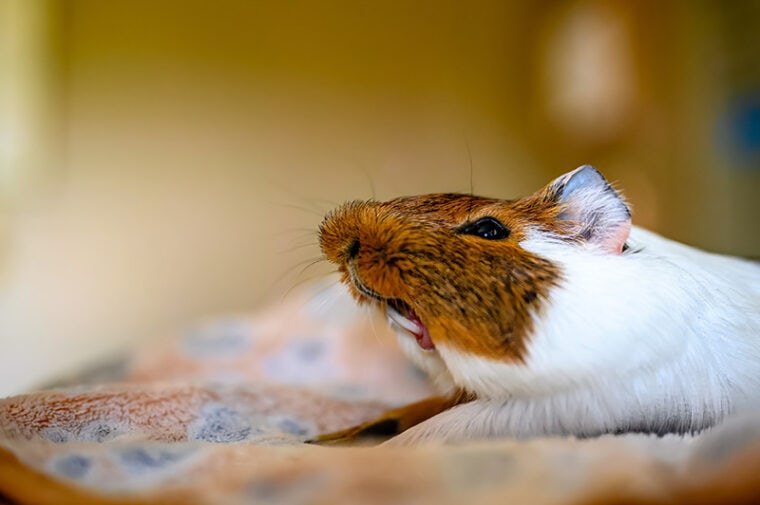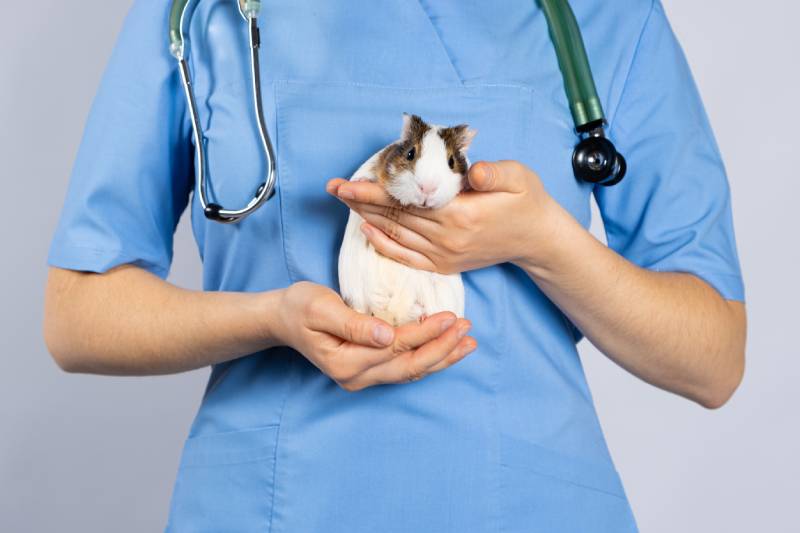
Click to Skip Ahead
Achoo! Did you know your guinea pig might sneeze, just like you? There are several reasons your guinea pig might let out sneezes, so paying attention and letting your veterinarian know if your guinea pig is showing signs of being ill is important.
Let’s look at some of the main reasons your guinea might sneeze and what you can do to help.
Guinea Pig Sneezes
An occasional sneeze from your guinea pig is nothing to worry about. They sneeze to clear dust, allergens, and other potential irritants out of their noses. It’s not surprising that animals so close to the ground that spend their time eating hay and sleeping in shavings would sneeze.

The 5 Reasons Why Guinea Pigs Sneeze
Let’s look at why your cavy might let out a series of nasally sneezes.
1. Upper Respiratory Infections
Unfortunately, upper respiratory infections are widespread in guinea pigs. If left untreated, these infections can progress from mild respiratory signs like sneezing to pneumonia. While viruses can cause some illnesses in guinea pigs, some common bacteria associated with upper respiratory infections in guinea pigs include:
Some of your other family pets can be a host for illnesses that your guinea pig can contract, particularly Bordetella bronchiseptica. If your dog has been boarded recently or gone to the groomers, consider keeping them separated from your piggie for a few days to make sure they’re not sick.
Your guinea pig may have multiple signs of an upper respiratory infection, including:
If you see any mix of those signs, you should take your guinea pig to the veterinarian’s office to examine your piggie. Your vet will examine your guinea, paying close attention to their sound. Your vet may suggest X-rays to look for evidence of pneumonia.
While your veterinarian may recommend a first-line antibiotic treatment, they might also collect samples from your guinea pig for culture to determine the organism causing the illness and to see the most effective antibiotics.
2. Allergies and Irritants
Your guinea pig may be susceptible to allergies, which can cause sneezing. Supervised time outside can be a great way to provide your guinea pig with enrichment and allow them to get some sun. It can also expose your piggie to pollen, however.
The bedding you use can also drastically affect your guinea pig. Wood shavings and materials that produce dust are less than ideal and may trigger your guinea pig to sneeze. Woods like pine and cedar also have naturally occurring aromatic oils that can irritate your guinea’s airways.
You’ll want to use appropriate bedding for your guinea pig. Fleece makes great bedding: it’s soft, absorbent, and washable, as are bath towels. You could also use paper and change it regularly or try aspen wood shavings as the safest word shavings option.
You should clean your guinea pig’s enclosure regularly. A build-up of ammonia from eliminations is very irritating to your guinea’s airways (as well as skin). It can make them more at risk for developing respiratory infections.
3. Nutritional Deficiencies
Do you know that guinea pigs, like you, can’t make their own vitamin C? Vitamin C is vital to your guinea pig’s immune system. If they’re deficient in it, they could develop scurvy.
Guinea pigs need 10 to 50 mg of vitamin C each day. There’s a big range because some guinea pig life stages need more, such as if they’re pregnant.
Vitamin C can be tricky to give your guinea pig because it’s not very stable, so adding it to the food or water could break it down. There are tablets and foods that you can give that are high in vitamin C, such as:
Talk to your veterinarian about the best ways to offer vitamin C to your cavy to help support a healthy immune system.

4. Dental Disease
Guinea pigs have teeth that constantly grow, so they must chew to wear them down. If an issue develops around a tooth, it can affect the sinuses because the upper or maxillary roots are directly below the sinuses. If your guinea pig has a tooth root abscess, it can cause nasal drainage and sneezing.
Ensure you give your guinea pig appropriate things to chew on to help them wear their teeth down naturally. Regular veterinary visits allow your vet to examine your guinea pig’s teeth and check for abnormalities such as a misaligned jaw or if the teeth are of different lengths.
5. Stress
Stress can have significant impacts on your guinea pig. When animals are stressed, they release cortisol within their bloodstream. This internal steroid can suppress your guinea’s immune system and make them more at risk for developing respiratory infections.
Try to keep your guinea pig from being stressed by limiting overcrowding and giving them a quiet resting place. Make sure that they’re not getting bullied by other guinea pigs (or even other animals in the house.
When Should You Worry About Your Guinea Pig Sneezing?
If your guinea pig is sneezing occasionally, it’s usually not anything to worry about, especially if you can determine if something might have triggered the sneezes, such as new bedding or if you were cleaning the house.
If the sneezing persists, particularly if it occurs with other signs like thick nasal discharge, coughing, weight loss, or lethargy, you need to contact your veterinarian.
Your veterinarian will generally start by taking a thorough guinea pig history. They’ll look over your cavy from nose to rear. In some cases, they may recommend diagnostic testing, such could include:
Treatment depends on what they suspect. An upper respiratory infection may require antibiotics and supportive care, such as oxygen and fluids. If it might be environmental, your veterinarian can help suggest changes to your guinea pig’s enclosure to help minimize symptoms.

What Can You Do if Your Guinea Pig Sneezes?
If your guinea pig is sneezing, start by assessing their environment. Have you changed the bedding recently? Is it dusty? Consider swapping to some fleece to see if it improves your guinea pig’s sneezes.
Look at their hay, as well. Hay can be quite dusty and come with mold spores if it’s no good. Make sure it looks and smells fresh. If it makes you sneeze, it might make your cavy sneeze, too.
You can also consider the location of your guinea pig’s enclosure. Is it located somewhere drafty where your guinea pig could get cold? Are there perfumes, candles, or deodorizing sprays nearby that could set off your guinea pig’s allergies? If the area feels drafty or is near a wall plug-in diffuser, try moving your guinea pig or eliminating the scents to see if that helps.
These options are relatively straightforward ways to minimize irritants that could inflame your guinea pig’s airways.
Frequently Asked Questions
Can I give my guinea pig water with vitamin C added?
Technically, you can add vitamin C to your guinea pig’s water, but you need to be aware of several things. First, it might change the taste of the water, and if your guinea pig doesn’t like the taste, they may stop drinking it. That can contribute to dehydration and a lack of vitamin C.
Vitamin C also breaks down quickly, so adding it to water is not a stable compound. You’ll have to change the water frequently for your guinea pig to benefit from it.
Can I use wood shavings for my guinea pig’s cage?
You should not use wood shavings or wood dust in your guinea pig’s cage. The one possible exception is aspen wood shavings. Wood dust is especially bad because it can easily be inhaled by your guinea pig and cause lots of sneezing.
Some woods are also problematic for other reasons. Cedar and pine shavings contain aromatic oils that can irritate your guinea pig’s nasal passages and could easily cause sneezing. It’s also important to note that cedar wood shavings can lead to liver problems in your guinea pig.
Conclusion
Your guinea pig may be at risk for sneezing and respiratory infections if their environment isn’t clean and maintained with low-dust bedding. It’s essential to remember that an occasional sneeze is usually nothing to worry about, but continued sneezing, changes in appetite or behavior, or other signs such as eye or nose discharge are reasons your guinea pig should see a veterinarian.
- See Also: How to Get Rid of Guinea Pig Smell
Featured Image Credit: Lost_in_the_Midwest, Shutterstock












